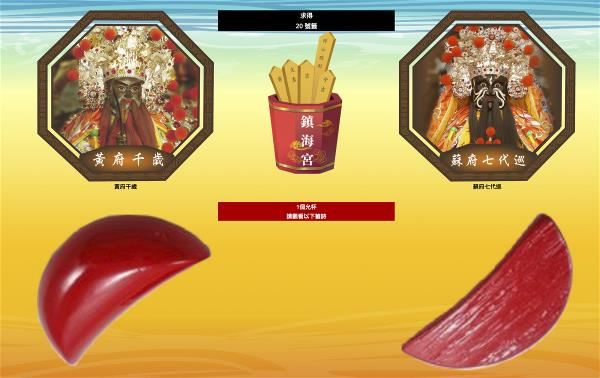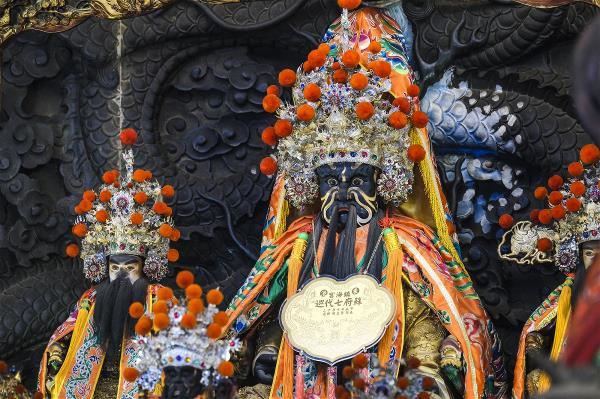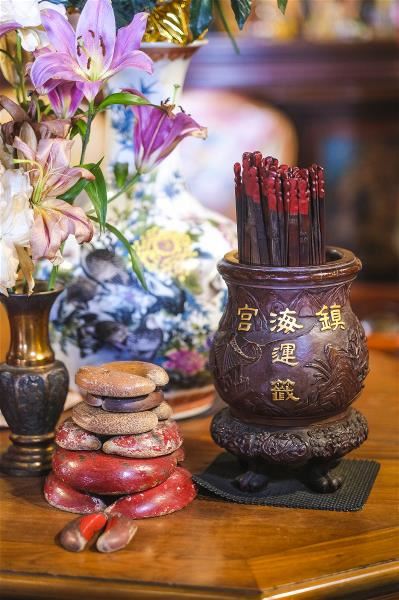2025-3-31
Courtesy of Taiwan Panorama March 2025
Chen Chun-fang /photo by Kent Chuang /tr. by Phil Newell
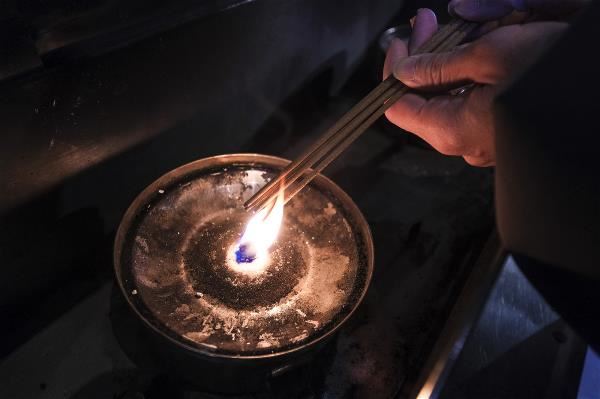
Before the Premier12 tournament of the World Baseball Softball Confederation in 2024, a netizen who felt uneasy about the event went online to the divination webpage of Donggang’s Jhen Hai Temple and received a “fortune verse” with the meaning “following hardship, rewards will follow,” thereby giving a boost to fan morale. Later the Taiwan team did indeed win the competition, adding a new aura to the practice of divination in Taiwan. But just what is it that Taiwanese ask of the gods? And how do fortune verses provide them with wisdom and solace?
“It’s because people have a desire to get a glimpse of the unknown future.” Lin Mao-hsien, associate professor in the Department of Taiwanese Languages and Literature at National Taichung University of Education, offers the following example: Perhaps a person does not know what kind of career to pursue, or whether a change of career is a good idea. When people feel uncertain, they will seek guidance from the gods. In everything ranging from profession, education and health to marriage and buying a home, anyone who feels troubled can resort to worship and divination, and seek divine enlightenment in the texts of fortune verses.
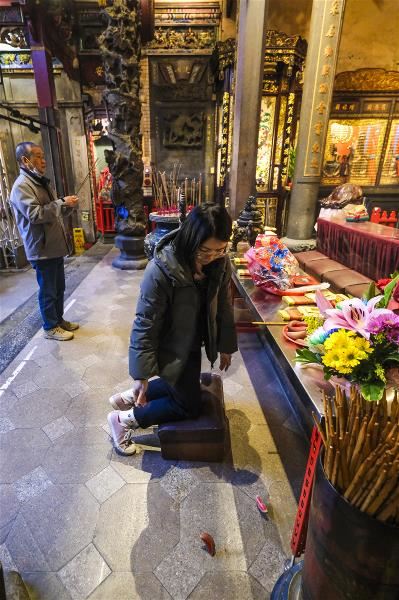
Gentle guidance from the gods
Lin notes that the divination procedure is basically the same at all temples. Generally speaking, one should first go into the temple, light some incense, and pay one’s respects to the deities, reporting one’s name, home address, and details of one’s queries. One must then get permission from the gods before drawing a fortune stick. In principle, supplicants should get one divination text for each query, because if one asks a deity about too many things at once, it will not know which matter to address.
How do we know if we have received permission from the gods? We must communicate with them by casting jiaobei (divination blocks, a.k.a. “moon blocks”). These are a pair of crescent-shaped red blocks that are flat on one side and rounded on the other. When you toss the two blocks on the ground, if one comes to rest with its rounded side facing up and the other with its flat side up, this is called shengjiao (“sacred blocks”) and it means that the gods answer “yes” to your question, or agree to your request. If both blocks land round side up, this is called yinjiao (“dark blocks”), which means a refusal. If the flat sides come up on both blocks, this is called xiaojiao (“smiling blocks”), and indicates that the deities have not yet decided, or are merely smiling, with no reply. This may mean that the question asked was not sufficiently clear, or it may just be a “do-over,” and signal that the person should toss the blocks again.
After getting permission from the deities to draw a divination text, one can take a fortune stick (marked with a number) from among the many held in a container. The containers in different temples vary considerably. If the container is small, the supplicant can pick it up and shake it, ending up with the fortune stick that protrudes most from the rest or falls out of the container altogether. If it is large, one can grab all the fortune sticks in one’s hands and then release them, and take the stick that protrudes the furthest. Then one casts jiaobei once more to confirm that one has drawn the right stick.
After getting confirmation from the deities, you go to the drawer where the fortune verses are stored and choose the one that matches the number on the divination stick. Lin Mao-hsien notes that there are normally two types of fortune verses. The first type uses historical stories or legends such as “King Wen Pulls the Cart” or “Three Visits to a Thatched Cottage” to express the divination, while the second type expresses it in poetry. Even if one isn’t familiar with the story cited, the fortune verse will include explanations for various requests, such as “wealth will be gained,” “the lawsuit will be won,” or “the marriage can go ahead.” Thus, the same text can be applied to a variety of situations.
For example, the divination drawn by the netizen on the eve of the Premier12 tournament read: “The divine rooster sees dawn breaking / For the actions of rat, ox and tiger shall tell the future / As clouds part to reveal the moon / You shall observe great harmony.” According to the accompanying explanation, this poem meant that previous toil would be crowned with success. With specific regard to the pursuit of success and fame, the text indicated that after ten years of hardship the day would come when one would stand out from the pack. In the end Taiwan won the championship, and people were amazed by the prognostication.
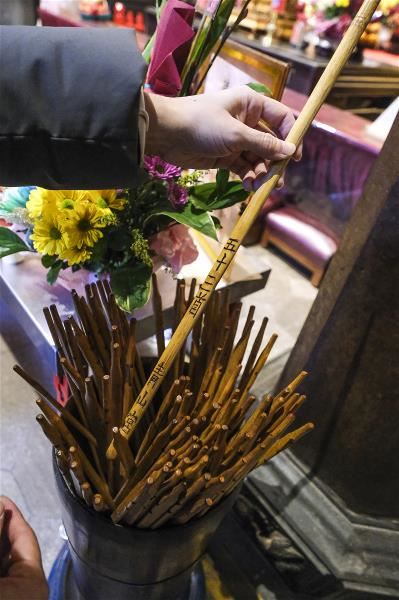
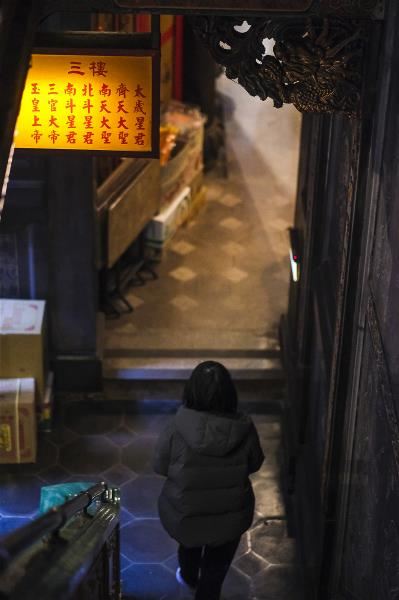
Spiritual therapy
Lin Mao-hsien argues that when people ask questions of the gods, it is invariably because they are in a situation where they have difficulty making a choice or are facing frustrations. Feeling helpless, they seek support from the deities. Some may feel that letting one’s future be decided by a divination text is too risky, but in fact, even before people inquire of the gods, they have already made a decision in their own minds, and they will interpret the deities’ advice according to their own hopes and expectations. “Fortune verses ultimately all strike an encouraging tone. They never say things like ‘you are sure to come a cropper’ or ‘you will not succeed.’” Because supplicants receive positive, uplifting responses, they will feel hopeful about the future. “This is in fact a kind of spiritual therapy in Taiwanese society,” says Lin.
But what if one draws a fortune verse that is very negative? Lin says with a laugh that it doesn’t matter: Even if a person gets a negative divination, they will pray to the gods for protection and for assistance in overcoming difficulties, and will remind themselves to be cautious in all they undertake.
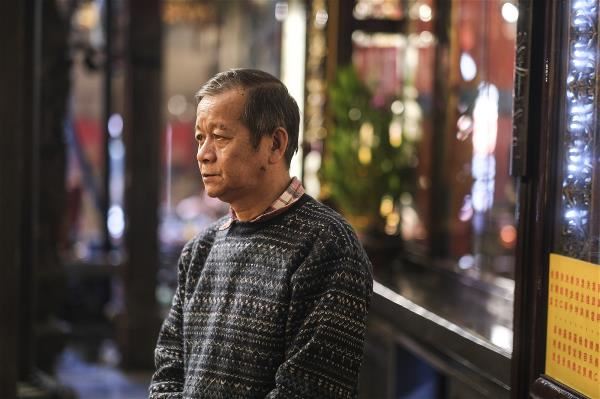
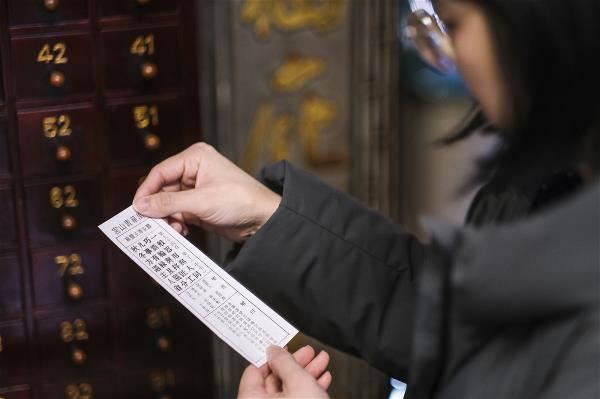
Online divination
In line with changing times, some temples have launched online divination services. The best known of these is offered by Jhen Hai Temple in Pingtung County’s Donggang Township.
The main deity worshipped at Jhen Hai Temple is “Lord Su, Heavenly Viceroy of Seven Provinces.” Cai Zhicong, a member of the temple’s management committee, tells us about the origins of the online divination service. In about 2001, the then-chair of the management committee wanted to bring Jhen Hai Temple into the digital age, so they sought someone out to build a website and began to offer online fortune telling. Every step in the digitization process, including the website design and the services offered, had to be approved by the deities.
The online divination pages of Jhen Hai Temple, in both Chinese and English, explain the divination procedure. First you should recite in your heart your name, address and question three times. Then click on the “divine cylinder” (the container holding the fortune sticks) and after getting a divination number, click on “confirm” below to cast the jiaobei. If the result is “yes,” then your fortune verse and its explanation will appear below.
Online divination is available 24/7 year-round, with no restrictions on time or place. Besides the English version of the webpage, Jhen Hai Temple has also come out with a smartphone app to make their online divination service even more accessible. Many netizens go to the comments section of the temple’s Facebook page to thank Lord Su for his help. Hong Xinqi, current chairman of the temple management committee, informs us that from time to time he runs into worshipers in the temple who tell him they have received help from Lord Su through online divination and have made a special trip to Jhen Hai to express their gratitude, bringing even more of the faithful to burn incense at the temple.
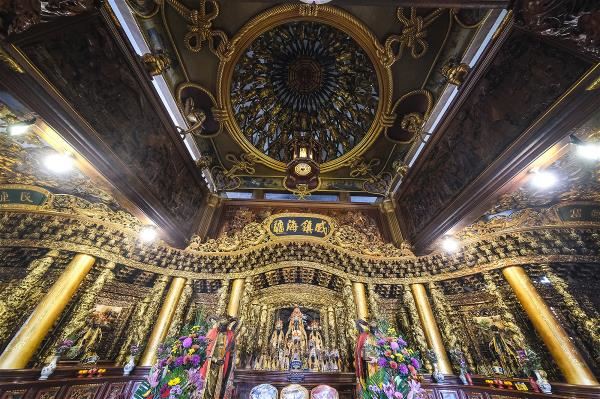
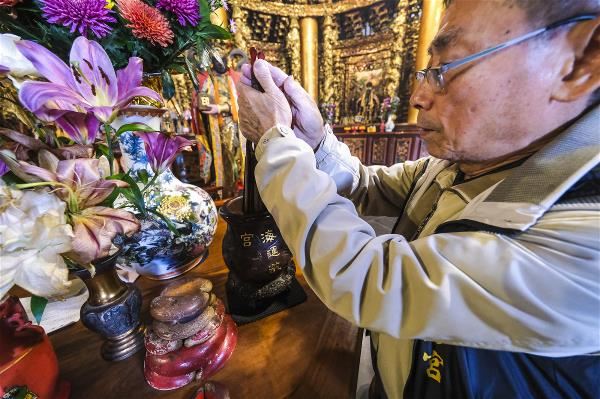
The sense of ceremony in temples
While online divination services are being provided by a growing number of temples such as Donglong Temple in Donggang; Chaotian Temple in Beigang, Yunlin County; Tianhou Temple in Lukang, Changhua County; and the Xia Hai City God Temple in Taipei, there is an irreplaceable sense of ceremony that comes with entering a temple in person to seek guidance from the gods face to face.
There are also tricks to in-person divination. Cai Zhicong shares the fact that sometimes the deity refuses to allow a person to get their fortune told no matter how many times they cast the jiaobei. In such cases they need to change the way their query is formulated, and ask whether the deities need more time to look into the matter, and whether they can come back and inquire again a little later or after a few days. Mysteriously, when the query is reformulated, the response from the deities is often an immediate “yes” (shengjiao on the divination blocks). Hong Xinqi adds that the forerunner to Jhen Hai Temple was a “joint temple” bringing together the deities of three local communities, so that many divine entities are worshiped there. He explains that Lord Su is the main deity, while the other gods are like his staff, and that when the management committee inquire about temple affairs, they will first confirm that Lord Su is personally in attendance. “If Lord Su is on duty, then the process of casting jiaobei and drawing fortune sticks will go very smoothly.”
As Lin Mao-hsien says, in every era there are souls who are wavering or feel helpless and need oracles to boost their confidence. Whether online or offline, divination by drawing fortune sticks remains important in the hearts and minds of the people, and the verses provided by the deities remain a gentle source of intangible support for Taiwanese in their daily lives.
